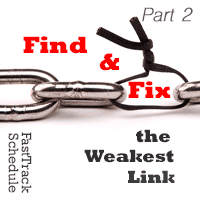 Lets start this one off by looking at some definitions…
Lets start this one off by looking at some definitions…
Subjective: based on or influenced by personal feelings, tastes, or opinions.
Objective: observable; able to be seen or proven; based on fact.
My wife and I got into a bit of a debate the other day on subjectivity vs. objectivity. It centered on the Ebola virus and when you’re symptom free vs. showing symptoms. Since certain symptoms aren’t so black and white like vomiting vs. fatigue, I say symptom-free is subjective. She said that I’m using the term wrong. I’m going to objectively say she’s wrong, but please don’t tell her that I said that.
What this got me thinking about is subjective vs. objective thinking and decision making on our projects. This can be the project manager making decisions, the customer making decisions, and/or the team making decisions. Actually, it can be any of a number of other stakeholders making decisions or helping to make decisions or participating in the project in any influential way. We hope everyone is acting – for the most part – objectively. We always hope for that. But we know that is not often the case…many have their own agenda to push or pursue on the project and will work to influence some key project decision making from time to time. The expectation, however, is that the project manager will maintain their integrity and work only objectively to provide the client with a workable solution that everyone can live with. Sounds easy? No worries there. No huge burden to carry. No?!? …didn’t think so. Because it’s not easy when so many may be working against you at any given time on the project.
So, how do we remain objective on the project and throughout all of our decision-making responsibilities and opportunities? It’s easy to fall into the subjective thinking trap accidentally or be swayed by false, incorrect, manipulated or miscommunicated information so the opportunities for human failure for the project manager are sometimes huge – and they might not see it coming. I, for one, can “objectively” say that I’m sometimes bad at reading people and seeing their true intentions. Yes, I can be gullible. There, I said it. Too trusting. So what do we do?
For me, it comes down to these steps to help me stay on the objective path when confronted with suggestions, information, agendas, and wishes that are presented – or thrusted – at me during the course of a project…
Is it in the customer’s best interest? The customer is #1 for me so I ask myself – is it in their best interest? And don’t take for granted that just because the customer is the one pushing for it that it is in their best interest. Look at it objectively – is this the way they really should go? If not, be bold and tell them. In the end, it’s their money so you may have to bow to their wants. But if it goes against the grain of what’s best, document it well that it was “their” decision so it doesn’t bite you later.
Is it in line with what we set out to do on the project? Is it aligned with the goals and mission of the project? Does it make sense? Technology is great, but if it’s unnecessary or not in the best interest of the final solution for the project, document why and explain it to the stakeholder who is backing it. You can see a common theme here…document! It keeps you from having to re-explain the same reasoning again and again and again and keeps yourself out of trouble at the end of the project. Win-win.
Is it even in scope? Finally, is it even in scope for the project? If it is and it makes sense, then great. But if it isn’t, then explain to the customer that it will cost “x” dollars to make this requirements change at this stage of the project and let them make that call in both financial and timeline terms.
Summary
Unfortunately, the project manager has to be the project grown-up and look at the overall project objectively when making decisions. You can’t just be swayed by the cool technology that some stakeholder wants just because you want to see what happens. Stay the course, avoid too much subjectivity when making decisions and you’ll come out on top hopefully more often than not.



